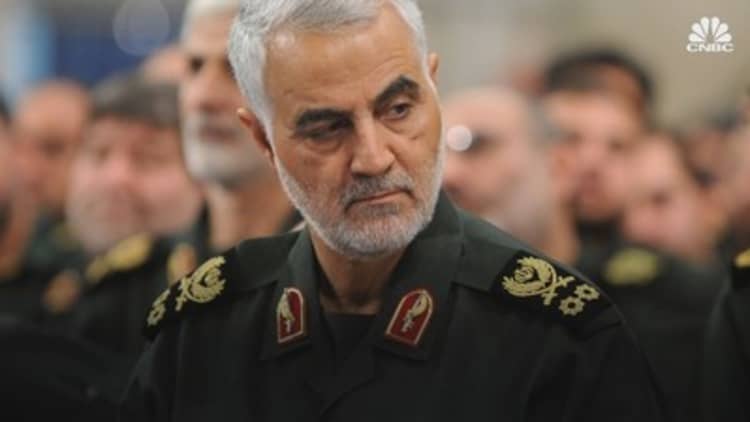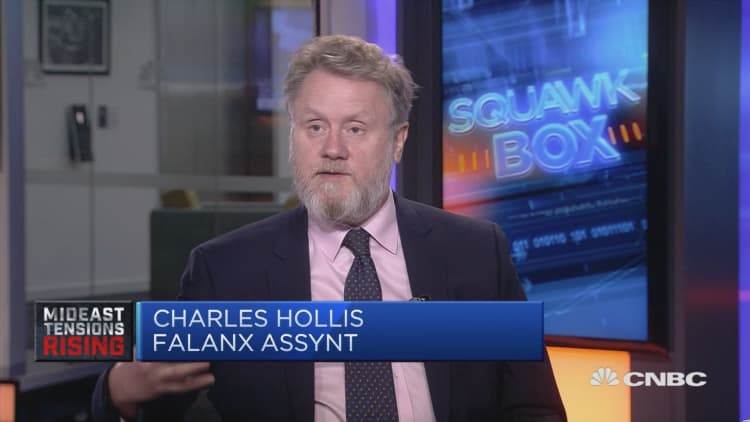Markets have had a field day since Wednesday, rebounding dramatically from the scare that followed the overnight missile attack by Iran on U.S. forces in Iraq.
The Nasdaq and S&P 500 hit record highs after President Donald Trump claimed a victory lap, declaring that Iran "appears to be standing down" after Tehran's initial threats of "severe revenge" for the killing of Iranian Gen. Qasem Soleimani had been less severe than feared.
Iran openly claimed the ballistic missile attack on two Iraqi military bases housing U.S. forces, with its supreme leader Ayatollah Ali Khamenei calling it a "slap on the face" for America. But there were no casualties, something analysts and reports suggest may have been intentional so as not to provoke a greater military response from the U.S. and trigger further escalation.
But is it over? Did the Trump administration's targeted killing of Soleimani, Iran's second-most powerful figure and the head of its Revolutionary Guard Quds Force, effectively put a lid on further escalation from Iran? And what's next for the Iranian nuclear deal?

Recent developments may offer a hint, but it's safe to say that many in Iran aren't satisfied. The head of the general staff of Iran's armed forces told Iranian news agency Tasnim on Thursday that "the regime will impose a more severe revenge on the enemy in the near future," and the head of the Revolutionary Guards' aerospace force said Iran had "hundreds of missiles at the ready," warning a series of attacks ahead.
Hours after Trump's statement, two Katyusha rockets hit the Green Zone in Iraq's capital of Baghdad, the area that houses the U.S. Embassy and other government buildings. There were no casualties, and the source of the attack was unclear, but the rockets are commonly used by Iraqi Shiite militias often backed by Iran like Kataeb Hezbollah or Asaib Ahl al-Haq. The former group is responsible for a Dec. 27 rocket attack that killed a U.S. contractor in northern Iraq, an attack that led to Soleimani's assassination.
Iran-US confrontation: 'Not the end of the line'
"Based on available evidence," political risk consultancy Eurasia Group said in an analyst note Wednesday, "this round seems over." Oil futures plunged around 5% as investor confidence, weighed down by Middle East tensions since Soleimani's killing, returned to the markets. Gold pulled back from its recent seven-year high.
But regional experts say that while a major conflict has been averted and Trump has chalked a domestic win, America's troubles with the Islamic Republic — and its ability to inflict damage on U.S. interests — won't go away anytime soon.
"For sure it's not the end of the line," Olivier Guitta, CEO of geopolitical risk consultancy GlobalStrat, told CNBC's "Street Signs." "Tehran is usually taking its time to retaliate ... Khamenei and the Revolutionary Guards want to take revenge. They will use asymmetric warfare, terrorism," but likely remain measured "because they know that Trump is extremely forceful when it comes to American lives, and they are not going to take the risk."

"Both sides do not want war and they'll avoid it at all costs. But a protracted terror campaign is in the works," he added.
Mixed messages from Tehran
Iran's Foreign Minister Javad Zarif appeared to signal the end of retaliatory measures, tweeting on Wednesday that his government "took and concluded proportionate measures" against the killing of Soleimani. "We do not seek escalation or war, but will defend ourselves against any aggression," he said.
But Zarif's words conflict with messaging from hardliners who are in fact more powerful in Iran's government: Khamenei on Wednesday tweeted that the missile attack "was not enough," and Revolutionary Guard officials warned that the missile barrage was "the first step" of retribution.
The Iranians have ramped up targeting of ICS (industrial control systems) recently. ... I can only imagine this just reinvigorated their efforts.Dominique HatcherFounder and CEO, PiiSec
For Soleimani's loyal followers in the proxy networks he helped build spanning Iraq, Syria, Lebanon and Yemen, the battle for revenge must continue. But it probably won't look anything like conventional war — something Iran's cash-strapped economy can't afford, particularly against a militarily superior U.S.

We "cannot exclude possibility that after this round of public showdown, U.S. and Iran will engage in covert/proxy attacks" tweeted Ellie Geranmayeh, an Iran expert and senior policy fellow at the European Council on Foreign Relations. Iran's strategic and longer-term response will be to reduce U.S. presence in the immediate neighborhood, she said, meaning it will likely target U.S. interests like military bases, companies and shipping.
"Iranian proxies will continue to harass U.S. forces in Iraq, and its navy will continue to torment commercial shipping," Eurasia Group said in its note. "The Revolutionary Guard probably will not consider the Suleimani debt to have been fully repaid; the risk of Iranian asymmetric responses remains high, particularly in the cyber or terrorism realms."
Still, analysts seem to agree that reprisals aren't likely to be severe enough to trigger a U.S. military response, as they know that American lives are Trump's red line.
This in no way precludes the possibility of American deaths, however; many of Iran's proxy groups carry out attacks independently and more recklessly, and Tehran's control over them may become more limited now that they no longer take direction from Soleimani.
Militia strikes and cyberattacks
Dominique Hatcher, a former U.S. intelligence professional and cyberthreat analyst, told CNBC she is worried about Iran's potential to attack industrial control systems on the U.S. mainland.
"The Iranians have ramped up targeting of ICS recently, even without (recent events) stoking the flames," said Hatcher, who founded cybersecurity start-up PiiSec. "I can only imagine this just reinvigorated their efforts."
Iran's cyber capabilities have increased rapidly in recent years, though the state has not yet been publicly tied to an attack on industrial control systems. Iranian hackers have already carried out destructive digital attacks, paralyzing computer networks around the Middle East like that of Saudi Arabia's state oil giant Aramco in 2012, and hitting several U.S. targets, including banks, a dam and a major Vegas casino.
Aviation and energy assets around the region, particularly those of U.S. allies like Saudi Arabia, the United Arab Emirates and Bahrain, are also at risk of cyber and proxy militia attacks, while Israel is considered the best equipped in the region to defend itself from retaliatory attacks by nearby Iranian proxies like Lebanon's Hezbollah.
Sanctions and the Iran nuclear deal
Not only are Iran's hardliners likely to continue seeking vengeance for their slain general, they're also still under crippling U.S. sanctions — seen as the primary reason for the escalatory yet calibrated disruptions Iran is accused of carrying out around the Gulf over the course of 2019.
Those include multiple attacks on commercial tankers and oil infrastructure — part of the "malign activity" the Trump administration cites as a basis for the sanctions — though Tehran denies its role. Iran last year downed a U.S. drone and seized foreign tankers in the Persian Gulf, and has suspended its compliance in the 2015 Iran nuclear deal.

The future of that deal is itself uncertain: Zarif and European ministers insist that the accord, which the Trump administration ditched in 2018, is not dead, and Iran says it will resume compliance if sanctions are lifted.
But Trump on Wednesday urged the deal's remaining signatories to abandon it and announced yet more sanctions on Tehran. The president is simultaneously calling for negotiation with Iran and a new deal — but given its continued pressure on the Iranian regime, and Tehran's simmering anger over the death of its revered general, a diplomatic breakthrough remains far less realistic than continued tensions.


